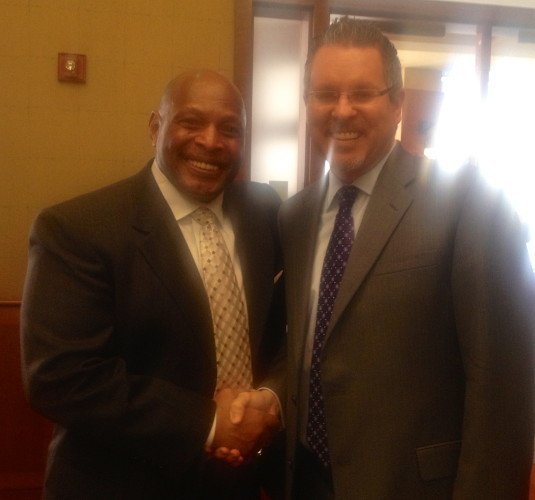On Friday, I had a great opportunity to teach a class of healthcare professionals at the Master of Business Operational Excellence (MBOE) program at Ohio State University's Fisher College of Business. I saw some of their capstone project presentations and I led an afternoon session discussing Lean, “sustainment” of changes, Kaizen, leadership and other topics related to their projects and work. Listen to a podcast about the MBOE program…
There was a special treat at lunchtime – the chance to hear two-time Heisman trophy winner Archie Griffin (and Ohio State graduate) give a talk. We are pictured at left — the Ohio State college football legend and the Northwestern marching band geek!
Griffin talked about how the legendary coach Woody Hayes recruited him in 1971 or 1972. After the dinner, Griffin told his father that he didn't think Hayes was going to offer a scholarship. Why? Because they didn't talk about football at all. Coach Hayes talked about the power of education and getting a college degree.
“An athlete without an education can get into a bad situation” is what Griffin stated as the philosophy of why a solid education needed to be a “backup plan” since so few college players actually make it in the NFL.
Archie Griffin was not only a great college player, but he earned a degree in industrial relations and played in the NFL. Griffin recalled that NFL players didn't make as much money as today, so he had jobs in the off season – working in personnel and HR functions, preparing for life after football and not wanting to start in an entry-level job when his NFL career, disappointing to many, would come to an end.
Archie Griffin has worked for the University in his post-NFL life, serving for about the last 10 years as the president of the OSU Alumni Association and serving as a beloved ambassador of the school and the football program.
I was reflecting on this phrase though… the “football program.” The “program” is sort of part of the learning mission of a university… or in many cases has surpassed the school in power and reputation (look to the Penn State scandal as an example of what happens when “the program” gets to be more important than the school.
I\'m proud that my alma mater, Northwestern, has a football team full of student-athletes who almost always earn their degrees. In 2012, this is surprisingly noteworthy in big time, big money college football. Northwestern is ranked #1 academically among the current top 25 BCS football teams.
So when we are talking about “sustainment” in terms of Lean healthcare, I was wondering how a university or football program sustains (or doesn't sustain) its standards, values, and mission. We used to hold Penn State in such high regard as a school and a football program that did things the “right way” under the late coach Joe Paterno — until we found out there was a culture of coverup and protecting the image of the program over the lives of abused kids.
Ohio State has struggled with sustaining the culture that Griffin and Hayes talked about — getting an education being a priority over football greatness.
During the 1990s, there were embarrassing stories about the lengths Ohio State would go to in keeping star players eligible, as in the case of linebacker Andy Katzenmoyer, who later played in the NFL. From this Sports Illustrated article: “Black Eye For The Buckeyes — How Ohio State kept linebacker Andy Katzenmoyer eligible“:
SI has obtained copies of two anonymous letters both signed “Sincerely, OSU Faculty” that were sent to Ohio State president William Kirwin last summer and that offer new details about Andy's excellent academic adventure. “The special treatment football player Andy Katzenmoyer has received this summer in order to be academically eligible is ridiculous,” said the first letter, dated Aug. 14. “Something is definitely wrong when the only grade given in [a mass communications course Katzenmoyer had taken in the first summer semester] is an A or A-for all 22 students enrolled, even though there was normal grade distribution/range for the course in previous quarters.”
The letter also questioned how Katzenmoyer, who it claimed had earned a 1.72 average or lower in five of his seven semesters, was “suddenly able to perform at the scholar-athlete level (3.0)” for the first summer term, and how he'd been squeezed into the golf class, which was full.
The second letter, dated Aug. 24, asked how, eight weeks into the summer session, Katzenmoyer had been granted a grade change for an art education class he had failed the previous spring. “The academic integrity of this University has become a joke,” the letter concluded.
Katzenmoyer famously took summer classes in golf and AIDS awareness…
Maurice Clarett, a star running back on Ohio State teams in the early 2000s, didn't graduate… he ended up in jail instead of playing in the NFL. He's now playing in the “UFL” — a minor football league. Clarett\'s life, sadly, isn't taking the same successful path as Archie Griffin.
In a recent book, Clarett recounted his time at Ohio State:
“I took golf, fishing, and softball as classes,” Clarett says. “Away from class, anything you can think of I did in my 13 months at Ohio State.” Drugs and women were two of the things. Cars were another. He owned three of them at a time, including a brand-new Cadillac and Lexus. “I was living the NFL life in college,” he says. “I got paid more in college than I do now in the UFL.”
Does this happen to every player at Ohio State? Of course not. But, Ohio State coach Jim Tressell resigned after a scandal where he covered up relatively minor NCAA violations, where players got free tattoos and other benefits from local businesses. As in many cases, the coverup was worse than the rules violation.
The 2012 Ohio State team went undefeated, yet cannot play in a bowl game this year because of sanctions that resulted from the Tressell era. Yet, he was given a standing ovation by OSU fans at a recent game. Hooray for winning… too bad about those ethics problems, we won't worry about that.
There are many things to reflect on… how many choices do organizations of all kinds make to put “winning” ahead of what the organization stands for? Students talked about the hard choices that hospitals have to make when faced with abusive surgeons… do you get rid of the surgeon who is physically and verbally abusive to staff or do you let them keep doing procedures because they bring millions of dollars of revenue to the hospital?
Discussions like these are taking place in the MBOE classrooms… the students want to do the right things and they want to work for highly ethical organizations. I\'m sure many current Ohio State football players want an education and to play for an ethical program and university. But, many programs steer players to easy majors and easy classes (the University of North Carolina had a recent scandal about this). I'm not saying Northwestern is without sin… but our starting left tackle, Patrick Ward, was an engineering student and an Academic All-American.
I love college football… but we should step back and ask how today's reality has gotten so off track from the goals and values of universities. We can ask the same thing about hospitals that are accused of putting profits before patients. How do we get things back on track? Is it possible?
How do we get more Archie Griffins and fewer sad cases like Maurice Clarett?
What do you think? Please scroll down (or click) to post a comment. Or please share the post with your thoughts on LinkedIn – and follow me or connect with me there.
Did you like this post? Make sure you don't miss a post or podcast — Subscribe to get notified about posts via email daily or weekly.
Check out my latest book, The Mistakes That Make Us: Cultivating a Culture of Learning and Innovation:











College is treated more like a minor league proving ground than a chance for education. I had actually heard rumors about Archie Griffin and his minimal academic exploits, but maybe that isn\’t truly the case and he is demonstrating he\’s doing something productive post-football. Great to hear.
I think this is a simplistic way of viewing intercollegiate athletics, but typically such inconsistent performance from school to school (excellent comparison of NW and tOSU) means a couple of things: one, the wrong things are being measured and used for accountability (focusing on wins instead of also focusing on GSR, for which Notre Dame is #1, and academic success) and two, the leaders are not properly holding violators accountable. It\’s as if Notre Dame, the Naval Academy, Northwestern, and other high-academic schools have to find their own metrics and measure themselves above and beyond those used as a mere baseline standard (I\’m looking at you, SEC).
Mark, for the fun of it I Googled \”Northwestern Scandal\” to see what would pop up. I did find something, um, well, let\’s call it \”interesting.\”
So, shoot straight with us, Mark. Did you attend any courses taught by a certain Prof Bailey during your days at Northwestern?
Apparently, this prof shared all kinds of amazing wisdom such as, \”Sticks and stones may break your bones, but watching naked people on stage doing pleasurable things will never hurt you.\”
I mean, with classes like that no wonder NW graduates every kid that straps on those purple helmets!!! ;-)
Details here (safe for work): http://www.cbsnews.com/8301-504083_162-20038506-504083.html
Yeah, I wouldn’t say Prof. Bailey’s human sexuality class ranks up there with the top academic disciplines or classes, but we’re comparing apples and oranges…
I’m not questioning the general Ohio State education… it’s just a shame that so many athletes seem to get a raw deal in life from so many big time colleges and their athletic programs. It would be unfair to single out The Ohio State University in this regard.
And Northwestern has had troubled athletes… a point shaving scandal that involved football and basketball players… it’s not a bastion of ethical perfection, but we don’t see cases like Katzenmoyer or Clarett, either.